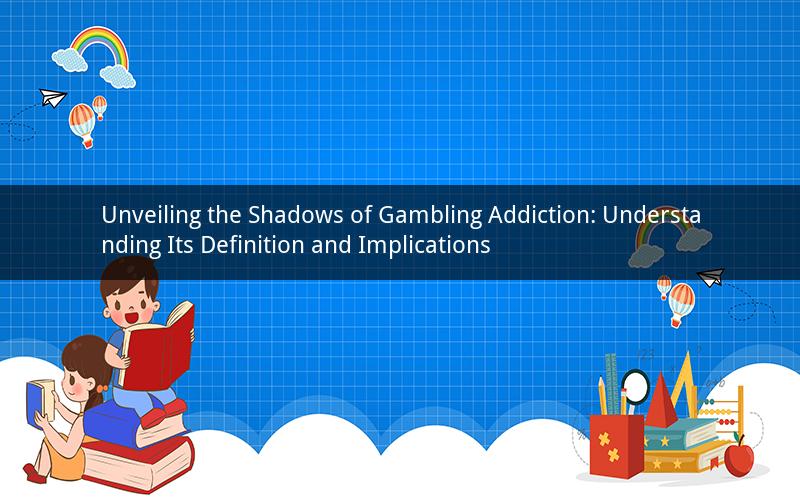
Introduction:
Gambling addiction, a term that often stirs controversy and confusion, has become a significant concern in today's society. This article delves into the concept of gambling addiction, its characteristics, and the implications it poses. By exploring the various aspects of this issue, we aim to shed light on what is considered gambling addiction and its impact on individuals and society.
1. Understanding Gambling Addiction:
Gambling addiction, also known as problem gambling or compulsive gambling, is a behavioral addiction characterized by an uncontrollable urge to gamble despite negative consequences. It is essential to differentiate gambling addiction from casual gambling, as the former involves a compulsive and harmful pattern of behavior.
1.1 Definition:
Gambling addiction is a condition where an individual engages in gambling activities excessively, leading to significant distress and impairment in various areas of life. It is crucial to note that gambling addiction is not solely based on the amount of money spent but rather on the impact it has on an individual's well-being.
1.2 Characteristics:
Several characteristics can help identify gambling addiction. These include:
a. Preoccupation with gambling: The individual constantly thinks about gambling, planning future gambling activities, or reliving past gambling experiences.
b. Loss of control: Despite attempts to stop or control gambling, the individual struggles to resist the urge to gamble.
c. Increased gambling frequency: The need to gamble becomes more frequent, leading to a decrease in other activities or responsibilities.
d. Chasing losses: The individual often tries to recover losses by continuing to gamble, despite the likelihood of further losses.
e. Lying and deception: To conceal gambling activities, individuals may lie to family, friends, or employers.
f. Financial consequences: Gambling addiction can lead to significant financial difficulties, including debt, loss of savings, or even bankruptcy.
g. Emotional and psychological consequences: Gambling addiction can cause emotional distress, anxiety, depression, and strained relationships.
2. Implications of Gambling Addiction:
Gambling addiction has profound implications on individuals, families, and society as a whole. Understanding these implications is crucial in addressing the issue effectively.
2.1 Personal Consequences:
a. Emotional distress: Gambling addiction can lead to feelings of guilt, shame, anxiety, and depression.
b. Relationship breakdown: Strained relationships with family and friends often occur due to the individual's preoccupation with gambling and its negative consequences.
c. Financial ruin: The individual may face severe financial difficulties, including debt, loss of assets, and bankruptcy.
d. Legal issues: Illegal activities such as theft or fraud may arise as a result of gambling addiction.
2.2 Family and Social Consequences:
a. Emotional turmoil: Family members may experience emotional distress, including guilt, anxiety, and depression due to the individual's gambling addiction.
b. Financial strain: Families may suffer financial difficulties due to the individual's gambling-related expenses.
c. Divorce and separation: Gambling addiction can lead to the breakdown of marriages and families.
d. Social isolation: The individual may withdraw from social activities and relationships due to the stigma associated with gambling addiction.
2.3 Societal Consequences:
a. Economic burden: Gambling addiction can lead to significant economic losses for individuals, families, and society as a whole.
b. Increased crime rates: Illegal activities such as theft, fraud, and embezzlement may rise due to the financial pressures caused by gambling addiction.
c. Healthcare costs: The emotional and physical health consequences of gambling addiction can lead to increased healthcare costs.
d. Decreased productivity: Individuals with gambling addiction may experience a decrease in productivity, impacting their work performance and potentially leading to job loss.
FAQs:
1. Q: Can someone be addicted to gambling without losing money?
A: Yes, gambling addiction can occur even without significant financial losses. The key factor is the preoccupation with gambling and the negative impact it has on an individual's life.
2. Q: How common is gambling addiction?
A: The prevalence of gambling addiction varies across different regions and populations. However, studies suggest that it affects a significant portion of the population, with estimates ranging from 1% to 5%.
3. Q: Can gambling addiction be treated?
A: Yes, gambling addiction can be treated through various approaches, including therapy, counseling, support groups, and sometimes medication. The key is seeking professional help and developing a comprehensive treatment plan tailored to the individual's needs.
4. Q: Is there a genetic component to gambling addiction?
A: Research suggests that there may be a genetic component to gambling addiction. However, it is important to note that genetics alone do not determine whether an individual will develop gambling addiction. Environmental factors and personal vulnerabilities also play a significant role.
5. Q: Can gambling addiction be prevented?
A: While there is no foolproof way to prevent gambling addiction, certain measures can be taken to reduce the risk. These include promoting responsible gambling practices, educating individuals about the risks, and creating a supportive environment that discourages excessive gambling behavior.